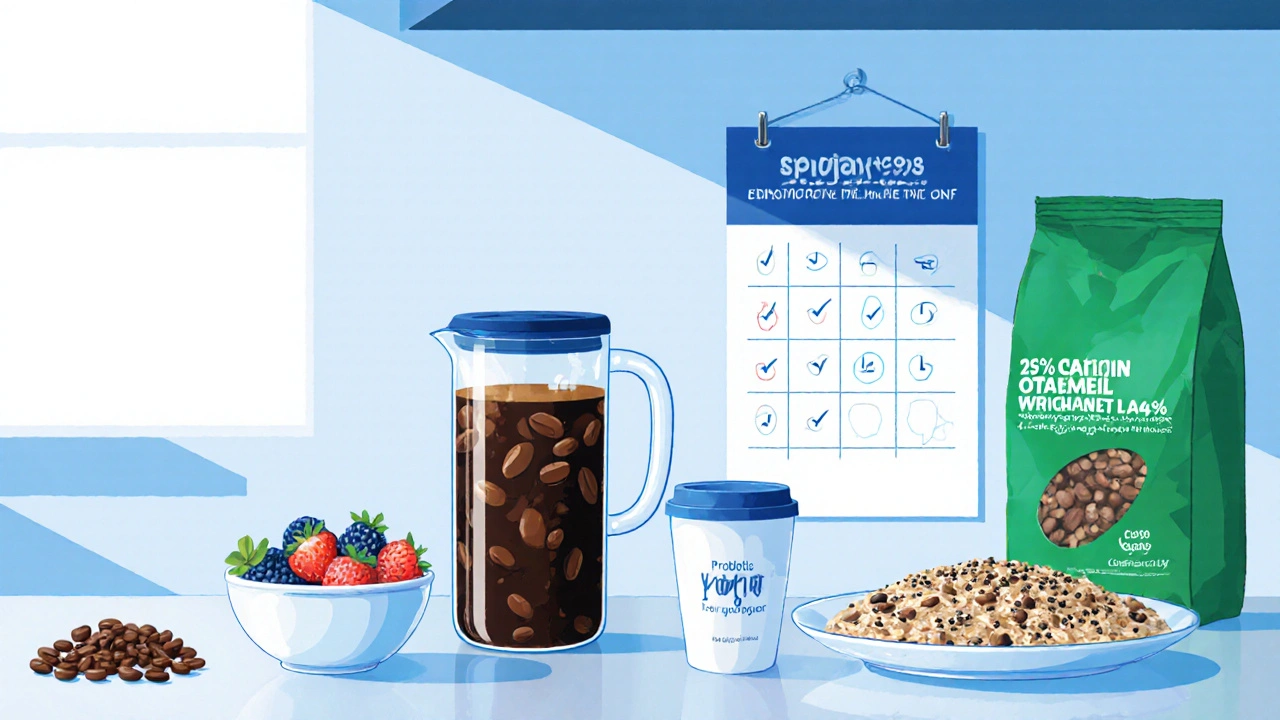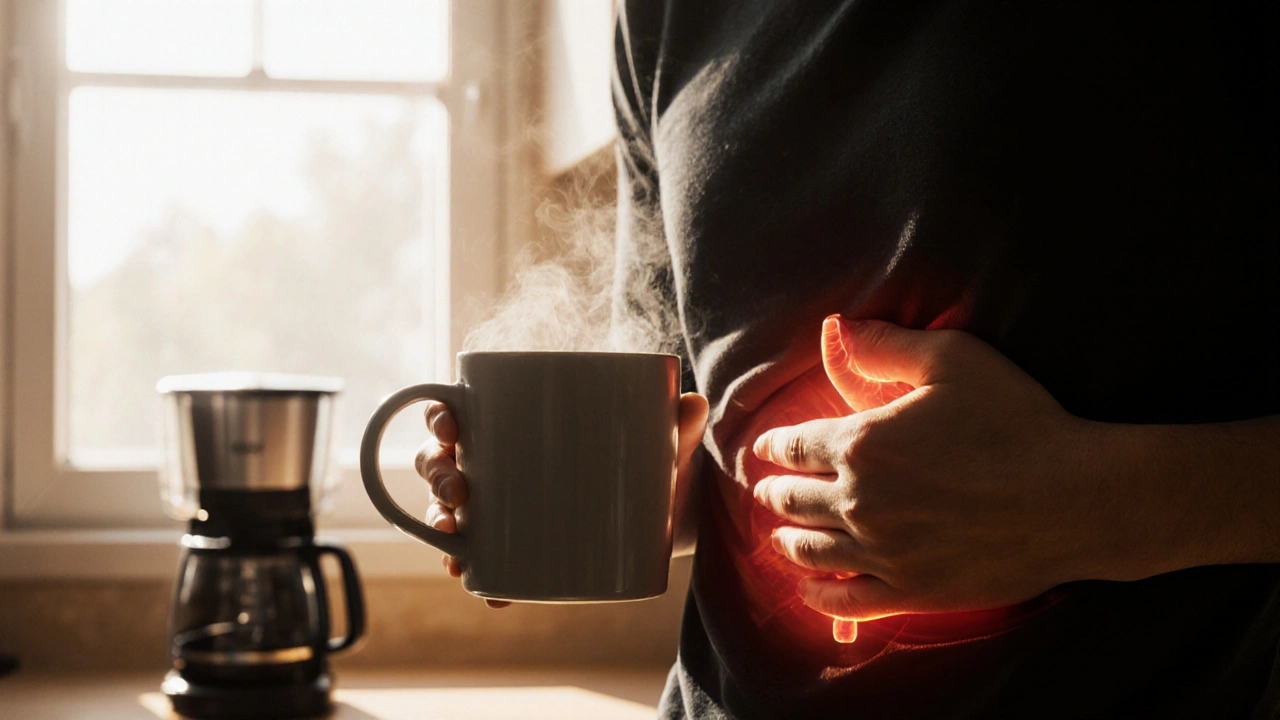Caffeine Stomach Ache Symptom Checker
Possible Cause
Immediate Relief Tips
Long-Term Adjustments
Caffeine is a natural stimulant found in coffee, tea, chocolate, and many soft drinks. It works by blocking adenosine receptors, boosting alertness, and can increase stomach acid production. If you love that morning brew but end up clutching your belly, you’re not alone. This guide walks you through why that happens and, more importantly, what you can do right now to calm the pain and keep enjoying your favorite drinks.
Quick Takeaways
- Identify the timing of symptoms to confirm caffeine as the trigger.
- Hydrate, eat bland foods, and consider antacids for fast relief.
- Cut back gradually, switch to decaf, or try cold‑brew to lower acidity.
- Support gut health with fiber, probiotics, and stress‑reduction techniques.
- Seek medical help if pain persists, worsens, or includes vomiting, weight loss, or blood.
Why Caffeine Can Irritate Your Stomach
The main culprits are increased stomach acid (hydrochloric acid) and a faster emptying of the stomach. When you drink a cup of coffee, caffeine signals the adrenal glands to release adrenaline, which speeds up digestion and makes the stomach produce more acid. For most people this is harmless, but if the lining is already sensitive, the extra acid can cause a burning stomach ache and even trigger reflux.

Is Caffeine Really the Cause? How to Pin It Down
- Keep a simple diary for three days. Note the time you drink caffeinated beverages, the type (espresso, latte, soda), and any stomach discomfort that follows within an hour.
- Watch the pattern. A consistent link between caffeine intake and pain strongly suggests causation.
- Try a short elimination. Skip all caffeine for 48‑72 hours and see if the pain fades. Re‑introduce it gradually to confirm the reaction.
Immediate Relief: What to Do When the Ache Hits
When the pain strikes, a few quick actions can calm the burn:
- Hydration is key. Sip warm water or an herbal tea (like ginger or chamomile) to dilute stomach acid.
- Take an over‑the‑counter antacid (calcium carbonate or magnesium hydroxide) if the pain is sharp.
- Eat a bland snack-plain toast, bananas, or oatmeal-to absorb excess acid.
- Consider a probiotic supplement or yogurt with live cultures. Probiotics help balance gut bacteria and can reduce irritation over time.
Adjusting Your Caffeine Habit
Long‑term comfort comes from tweaking how, when, and what you drink.
| Drink | Caffeine (mg per 8oz) | Typical Stomach Impact | Best Alternative for Sensitive Stomach |
|---|---|---|---|
| Caffeinated coffee | 95‑150 | High acidity, can trigger pain | Decaffeinated coffee (≤5mg) |
| Espresso | 63 | Concentrated acid, strong hit | Cold‑brew (lower acidity) |
| Black tea | 40‑70 | Moderate, often gentler | Herbal tea (no caffeine) |
| Soda/energy drinks | 30‑80 | Acidic, added sugars worsen irritation | Water or flavored sparkling water |
Tips for a smoother transition:
- Cut back 25% each week instead of quitting cold turkey.
- Drink coffee after a meal, never on an empty stomach.
- Try cold‑brew or French‑press methods-they produce less acid than drip coffee.
- Swap occasional cups with decaffeinated coffee or herbal teas.

Boosting Gut Health for Long‑Term Comfort
A resilient gut handles occasional acid spikes better. Focus on these habits:
- Increase dietary fiber. Whole grains, fruits, and vegetables add bulk and help regulate acid production.
- Stay consistent with probiotics. Fermented foods like kefir, sauerkraut, and kimchi keep the microbiome balanced.
- Limit other irritants-spicy foods, heavy fats, and alcohol-especially if you already have a sensitive stomach.
- Practice stress‑relief techniques (deep breathing, short walks). Stress can increase stomach acid secretion.
When to Seek Professional Help
If your pain lasts more than a few days, is severe, or comes with any of these signs, it’s time to see a doctor:
- Vomiting blood or material that looks like coffee grounds.
- Unexplained weight loss or loss of appetite.
- Persistent heartburn that wakes you at night.
- Swallowing difficulty or a feeling of food getting stuck.
These symptoms could point to gastroesophageal reflux disease (GERD) or an ulcer, conditions that need targeted treatment.
Frequently Asked Questions
Can I still drink coffee if I have a caffeine stomach ache?
Yes, but you’ll need to adjust the type, amount, and timing. Switch to decaf or cold‑brew, limit to one cup a day, and always drink after a meal.
Do antacids interfere with caffeine absorption?
Most antacids work locally in the stomach and don’t significantly affect how caffeine is absorbed. However, taking them at the exact same moment as a coffee can lessen the coffee’s stimulant effect for some people.
Is it safe to take probiotics daily?
For most healthy adults, a daily probiotic supplement or a serving of fermented food is safe and can improve gut balance. If you have a compromised immune system, talk to a doctor first.
How long does it take for the stomach to heal after cutting caffeine?
Mild irritation often improves within a week of reducing caffeine. More chronic inflammation or ulceration may need several weeks to months and possibly medication.
Are there any home remedies besides antacids?
Yes. A mixture of half a teaspoon of baking soda in a glass of water, a spoonful of honey, or a slice of ginger can neutralize acid and soothe the lining.


Hutchins Harbin
Caffeine on an empty stomach is a recipe for stomach pain.